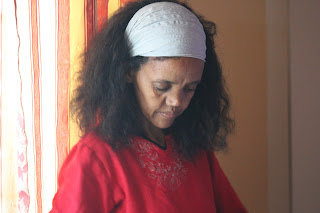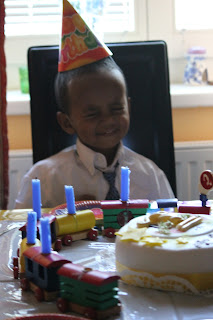Together with the Points-Coeur/Offenes Herz/Heart's Home family all over the world, on the 17th of September we made a pilgrimage to a Marian shrine in our country of mission with our community and our friends as a way of saying thank you to Our Lady for her guidance and protection and to entrust the coming year to her intercession.
It was during the rosary that Fr. Thierry received the intuition to begin Heart's Home and thus we have a special devotion to our lady--especially our Patroness Our Lady of Compassion, or Our Lady of Sorrows.
The Saturday following the Feast day of Our Lady of Sorrows, we made a <modern> pilgrimage to Maria Lanzendorf, the Austrian shrine to the Schmerzhaften Muttergottes. The pilgrimage church is actually a Franciscan cloister (with a tiny community of two friars and one nun running the cloister) with a beautiful church, inside of which is enclosed another chapel (much like how the Francis of Assisi's Portiuncula is enclosed in the church in Assisi) holding the shrine to the Austrian Pieta, an adjoining cloister a huge garden and yard, a sick house (where the sick friars used to be taken and cared for in order not to infect the others), and a Mount Calvary which entails quite a unique story.
Fr. Jacques, Alina, and I were accompanied by Monika, Roberta, Liz, and Raphael. When I say <modern> pilgrimage, I mean that we took the U-bahn to the bus station, then the bus a half an hour until it was more or less outside of the city grid, where we got off and then walked a half an hour until we arrived at the Church.
We first had a tour through the Church during which we learned amazing things about the Church that we had no idea of before, and which made our pilgrimage there even more meaningful...as you will see when I explain more about the church...then we celebrated the mass in the shrine chapel, had an hour of adoration, and then had a picnic in the huge garden behind the cloister. It was a lovely afternoon spent together.
he shrine is one of the oldest in Austria, most of the early history surrounding which is speculation, some of which is legend, and some of which is supported by evidence. All of which is fascinating and made our pilgrimage there so much more interesting.
THE LEGEND:
The place where the inner shrine stands was already visited in 70, 71, or 77 AD by St. Luke the Apostle who preached the gospel to the people here. There is supposedly a rock buried beneath the chapel on which it is stated.
In 174 AD, Marc Aurels build a little chapel on the site after winning a battle in the Roman war against the Marcomanni.
Then in 508, the legend of the church intersects Arthurian legend, for King Arthur is said to have erected a chapel in honor of St. Luke on the site.
In 791, Charlemagne defeated the Huns and re-erected the sanctuary saying that Our Lady of Sorrows had always directed his hand and Charlemagne himself is said to have brought the picture of Our Lady of Sorrows that he always had with him to the chapel and left it there to instate a shrine.
In 1191 it is said that Archduke Leopold V, the Virtuous, came to the shrine after winning a bloody battle, his tunic soaked in blood and he lay his tunic, his sword, and its sheath in from of the picture of Our Lady of Sorrows. His tunic, so bloody from the war, had two red sections, with a white, untainted section in the middle and this tunic, according to legend, is the origin of the Austrian flag.
THE HISTORY:
The first authentic, historical date was that in 1145, the church that was destroyed by enemies on this site, was reconstructed and from the year 1267 on, there was a small chapel here where the mass was celebrated daily and in 1418, Maria Lanzendorf was instated as a place of pilgrimage.
In 1529, the chapel was during the Turkish invasion.
Priests and Pilgrims from Vienna and surrounding area came in the following years to celebrate mass at this place, and it was especially a place of refuge during the time of the plague in 1679. But in 1683, the chapel was once again beseiged by the Turks and since then the gothic holy picture of Our Lady of Sorrows was stolen and not seen again. Directly after driving the Turks out, a sculptor fashioned a pieta of Our Lady of Sorrows which now sits in the pilgrimage chapel. A third order Franciscan was put in charge of keeping the chapel in order, but with the large number of pilgrims visiting the shrine and the large amount of work that would fall on one person, in 1696 Emperor Leopold I and his wife Maria Theresia ordered a cloister to be built on the grounds with a large church that would encapsulate the existing shrine. They then gave the cloister to the Franciscans from Vienna and entrusted to them the upkeep of the shrine. And since then the pilgrimage shrine has had close ties with the royal family up until the present day.
The Mount Calvary which I unfortunately didn't get a picture of is a unique testament to Baroque piety and has a funny story. It is an artificially created hill with a chapel and grotto built into it, and following the ascent up the hill are the statues depicting the way of the cross with the crucifixion obviously crowning the mountain (quite a site in a quaint little austrian town). There was a Francsican brother named Felix who made a beautiful and deeply impacting trip to the holy land and upon his return in 1699, began to plan the erection of Mount Calvary which was particularly endorsed by Emporess Maria-Theresia who had a deeply spiritual experience while climbing the Holy Stairs on her knees in Rome.
Here we are after the pilgrimage preparing for our picnic!
Monika, Fr. Jacques, and Liz
Roberta, Me, and Alina
Cleaning up after the picnic
The next day after the pilgrimage, I attended Sunday mass at Stephansdom because the city was celebrating the largest Catholic feast day of Austria, <Maria-Namen-Feier>. It is usually held in the Wiener Stadthalle to hold the thousands of people that come from all over the world to pray the rosary, celebrate the mass with the Cardinal, Bishops, Papal Nuncio, and believing Austrian government officials and then walk in procession through the first district from the Cathedral to the Statue erected in honor of Maria after the defeat of the Turks in 1683.
The feast day is particularly significant in Austria for two reasons:
1. It is a celebration of the feast day of the Holy Name of Mary which was instated by Pope Innocent XI in thanksgiving for Mary's intercession and aid in the Battle of Vienna (the leader of the European troops had entrusted his men to the Blessed Virgin) in which Christian Europe defeated the Muslim forces of the Ottoman Empire and therefore saved Europe from the would-be subsequent Turkish invasion.
2. It is a celebration of thanksgiving for Mary's aid in the miracle of Austria's liberation from Russian occupation through a Rosary Crusade led by a Franciscan priest P. Peter Pavlicek after World War II. Five years after WWII was over, Franciscan friar Peter Pavlicek conceived the idea to arrange a nightly Light of Procession, praying for the intention of the Soviet withdrawal. He was sure that the problem of Austria's liberation from the Soviets might be and had to be entrusted to the Blessed Virgin. He wrote to chancellor Raab that, "We can only switch from 'niet' to 'ja' through Mary's support!" Tens of thousands of people marched along the Ringstrasse holding candles and praying rosaries. The outstanding Austrian politicians of the time took part in the procession--including Chancellor Leopold Figl, and leader of the Austrian People's Party Mr. Juilius Raab. It was Chancellor Figl who said to P. Peter before the organized procession, "Peter, for my fatherland, it is worth it for me that we pray even if only you and I make the circuit and plead. We will not be freed otherwise!" Contrary to what they thought in face of all the ridicule and scorn, 15,000 people took party in the procession and people have added to this number reaching upwards of 80,000 some years after. On April 13th of that year (the feast of Fatima, which played a huge role in P. Peter's leadership of the procession in Austria) the Soviet's unexpectedly changed their minds and having received generous indemnity, they agreed to leave Austria. A treaty of withdrawal of all the Soviet occupational troops from Austria was signed in May and in October the last Red Army soldier left Austria. The bells in all Austrian churches began to toll. To mark the thanksgiving they were ringing for three days and nights. Chancellor Raab himself lead the thanksgiving prayer on Saptember 12th during the Maria-Namens-Feier that year, which he concluded with <We are free! Thanks to you, Holy Mary!>
 |
| I just love the little Missionaries of Charity--they are so easy to spot wherever they go and immediately bring such joy to my heart! |










































